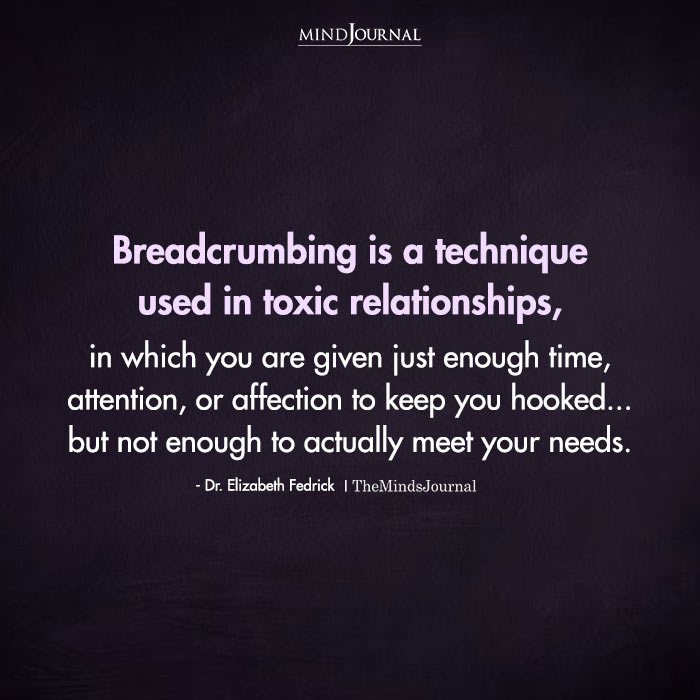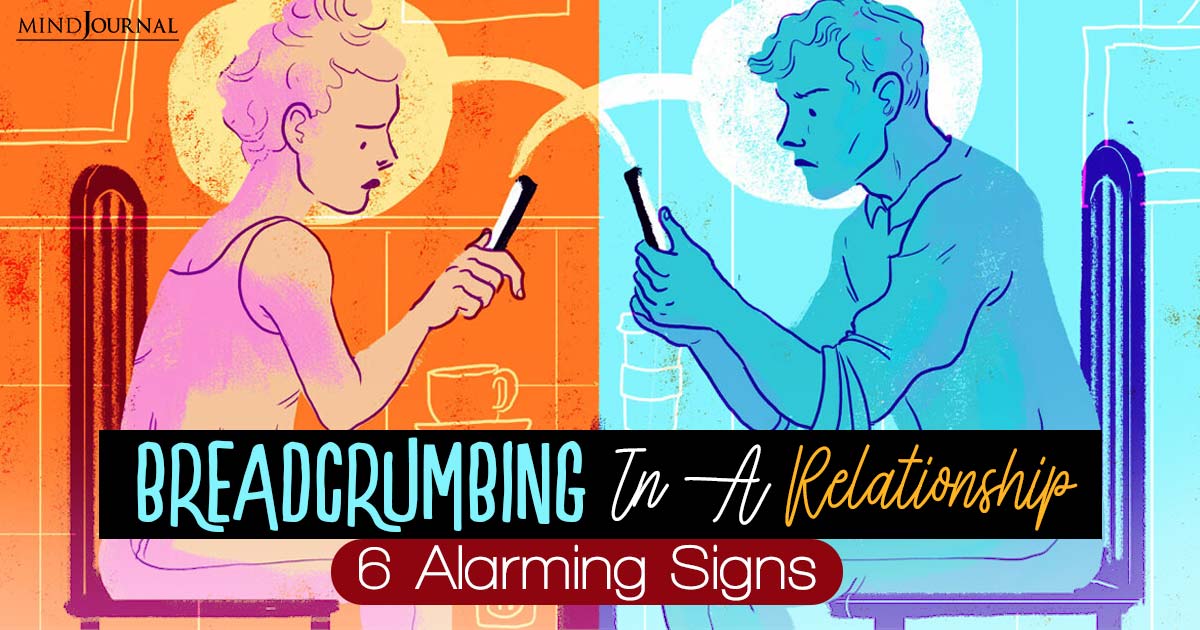Breadcrumbing in a relationship is like leaving tiny hints of interest without real commitment. It is confusing and can leave you wondering where you stand.
So, how do you know if it’s happening to you?
In this guide, we’ll discuss five signs of breadcrumbing in a relationship. We will also be providing strategies on how to deal with breadcrumbing in a relationship.
But first, let us learn about the breadcrumbing meaning.
Breadcrumbing Meaning

Breadcrumbing isn’t just confined to the realm of romantic relationships; it can manifest itself in various facets of our lives.
For instance, in the professional sphere, it might involve receiving intermittent assurances of career advancement or recognition without any substantial follow-through or concrete opportunities for growth.
Developing the ability to identify these subtle patterns in different areas of our lives can empower us to establish clear boundaries and prioritize relationships and pursuits that genuinely contribute to our overall well-being and fulfillment.
Now let us look at the breadcrumbing meaning in terms of a romantic relationship.
What Is Breadcrumbing In A Relationship
Breadcrumbing, or “Hansel and gretelling,” is a sneaky emotional game that some people play in the dating world. They enjoy the thrill of the chase more than the real work of being in a relationship.

These folks are unpredictable, giving you just enough attention to keep you interested, but never enough to truly commit. This can happen whether you’re casually dating or in a serious relationship.
It’s like getting crumbs instead of a full meal – it might seem like something, but it’s not really satisfying or fulfilling.
So if you’ve ever felt confused or insecure about where you stand with someone, you might have been a victim of breadcrumbing.
Read More: 3 Reasons Why Breadcrumbing Is Worse Than Ghosting
Signs Of Breadcrumbing
With its subtle yet emotionally tumultuous nature, breadcrumbing can leave you questioning the authenticity of your relationship.
Here are six telltale signs of breadcrumbing in a relationship to watch out for, helping you navigate the treacherous path of modern romance:
1. Flirty Banter, No Action
You find yourself engaged in playful banter, but the relationship never progresses beyond that. Despite hints or expectations, they never take the initiative to move things forward or solidify plans.
2. Focused on Physical Intimacy

Their interest seems to revolve solely around physical intimacy, leaving you with a sense that your worth is solely tied to satisfying their desires.
3. Consistently Unavailable
They always seem to have a busy schedule or a series of mysterious emergencies that prevent them from spending meaningful time with you. While they may apologize, there’s no real effort to change the situation.
4. Vague Communication
Conversations with them often feel like decoding a cryptic message. You’re left deciphering mixed signals and seeking reassurance from others about their true intentions.
5. Contradictory Behavior
They might express intense interest one moment, speaking of a future together, only to act in ways that contradict their words. As you grow closer, they tend to pull back, creating confusion and emotional turmoil.
6. Thrives on the Chase
Their attention peaks when you begin to withdraw, as they relish the challenge of winning you back. This dynamic creates a cycle of pursuit and rejection, leaving you uncertain about their true intentions.
Recognizing these warning signs can help you navigate breadcrumbing and protect your emotional well-being.
Remember, you deserve a relationship built on sincerity and genuine connection.
Read More: Toxic Love Disorder: 9 Signs To Look Out For
Reasons For Breadcrumbing In A Relationship
People engage in breadcrumbing for various reasons, often stemming from underlying emotional wounds and personal insecurities. Understanding these motives can shed light on the complexities of human behavior within relationships.
The following are some reasons for breadcrumbing in a relationship:
1. Low Self-Esteem
Breadcrumbers with low self-esteem seek validation and approval, using intermittent attention to temporarily boost their confidence and self-worth.
According to studies, lack of self esteem may lead to low self-esteem among individuals. And can also stem from past childhood traumas.
Read More: What Is Childhood Trauma? 4 Signs of Lingering Childhood Hurt
2. Loneliness

Breadcrumbing offers a sense of connection without the vulnerability of a genuine relationship, providing a temporary reprieve from feelings of isolation and emotional detachment.
3. Fear of Commitment
Some individuals avoid commitment, finding solace in the thrill of the chase without the responsibilities and sacrifices of a committed relationship.
4. Avoidant Attachment Style
Those with an avoidant attachment style struggle with intimacy and often retreat when relationships become too close, reverting to familiar patterns that allow them to maintain emotional distance.
5. Narcissistic Tendencies
For individuals with narcissistic personality disorder, breadcrumb can serve as a tool for emotional manipulation and control, allowing them to maintain power and dominance in the relationship.
Read More: What Is Narcissism? 22 Signs, Causes, Types And How To Cope
6. Past Relationship Trauma
Breadcrumbers may have experienced significant emotional trauma in past relationships, leading them to perpetuate patterns of emotional distance and self-preservation to avoid being hurt again.
Understanding these underlying motivations can provide clarity and insight into breadcrumbing in a relationship.
Impacts of Breadcrumbing In A Relationship
Understanding the potential impacts of breadcrumbing is crucial in recognizing the need for establishing healthy boundaries and fostering relationships built on genuine trust and mutual respect.
Here are some of the key consequences of what is breadcrumbing in a relationship:
1. Emotional Turmoil

Breadcrumbing can leave the recipient in a perpetual state of emotional turmoil, oscillating between moments of hope and disappointment, ultimately eroding their sense of security and stability within the relationship.
2. Eroded Trust
The inconsistent and insincere behavior associated with breadcrumbing can undermine the foundation of trust in a relationship, leaving the recipient wary of the other person’s intentions and authenticity.
Read More: 11 Reasons Why Trust Is More Important Than Love In A Relationship
3. Self-Doubt
Continuous exposure to breadcrumbing can lead to profound self-doubt and a diminished sense of self-worth, as the recipient grapples with the ambiguity and uncertainty surrounding their partner’s true feelings and intentions.
4. Communication Breakdown
Breadcrumbing often results in a breakdown of open and honest communication, as the recipient may feel hesitant to express their true emotions and concerns, fearing further rejection or manipulation.
5. Inhibited Growth
Constant engagement with breadcrumbing can hinder personal growth and prevent the establishment of meaningful and fulfilling connections, as the recipient may become emotionally guarded and reluctant to engage in future relationships.
By establishing clear boundaries and advocating for open and respectful communication, you can protect your own emotional well-being from what is breadcrumbing.
How To Deal With Breadcrumbing
Responding to and managing breadcrumbing in a relationship can be challenging, but implementing certain strategies can help you navigate the situation and prioritize your emotional well-being. Here are some effective ways to deal with breadcrumbing:
1. Direct Communication
Address the issue directly by expressing how the behavior impacts you and your emotions. Communicate your concerns openly and honestly, fostering a clear understanding of your boundaries and expectations.
2. Align Expectations
Have candid conversations to determine whether both parties share the same relationship goals and values. Understanding each other’s intentions can help establish mutual clarity and avoid misunderstandings.
3. Set Boundaries
Identify what is non-negotiable for you and establish clear boundaries within the relationship. Stand firm in your values and avoid enabling behaviors that contradict your emotional well-being.
4. Seek Support
Discuss your concerns with trusted individuals who can offer valuable insights and perspectives. Being open to constructive feedback can provide a fresh outlook on the situation and help you make informed decisions.

Research shows that seeking the help of professionals will help you better manage the emotional turmoils of a toxic relationship.
Read More: What Is Psychotherapy: Techniques, Types And Benefits
5. Practice Self-Compassion
Remind yourself that your worth isn’t defined by someone else’s actions. Cultivate self-compassion and acknowledge that you deserve genuine love and respect, irrespective of any hurtful experiences.
6. Boost Self-Esteem
Focus on building a strong sense of self-worth and confidence. When you prioritize your emotional well-being, you become less susceptible to tolerating unhealthy behaviors from others.
Trust in your own worth and never settle for anything less than the love and commitment you deserve. Stay true to your values, and remember that your emotional well-being is paramount in any relationship.
Putting an End to the Trail
Breadcrumbing in a relationship can be a bewildering and emotionally taxing experience, leaving you with more questions than answers. However, it’s crucial to recognize that you have the power to take control of the situation and protect your emotional well-being.
By understanding the breadcrumbing meaning, motivations, and impacts of breadcrumbing, you’ve already taken a significant step toward regaining your clarity and confidence in your relationships.
Remember that you have the right to set non-negotiable boundaries in your relationships and should never enable behaviors that go against your emotional well-being.
Seek support from trusted friends or family members who can provide valuable insights, and be open to constructive feedback, even when it’s not what you want to hear.
Frequently Asked Questions (FAQs)
1. What is the breadcrumbing meaning?
Breadcrumbing is a deceptive practice in relationships where one person intermittently shows romantic interest without genuine commitment, leaving the other party confused and insecure.
2. What is breadcrumbing in a relationship?
Breadcrumbing in a relationship involves offering intermittent attention without true emotional investment, leading to confusion and mistrust due to mixed signals and inconsistent communication.
3. What are the signs of breadcrumbing?
Signs of breadcrumbing include consistent flirting without progression, emphasis on physical intimacy, unavailability, vague communication, mixed messages, and increased interest upon withdrawal, creating a cycle of pursuit and rejection.
4. How to deal with breadcrumbing?
Address it through direct communication, setting clear boundaries, and aligning expectations. Prioritize self-worth, seek support, boost self-esteem, and practice emotional self-care while refraining from retaliatory behavior.










Leave a Reply